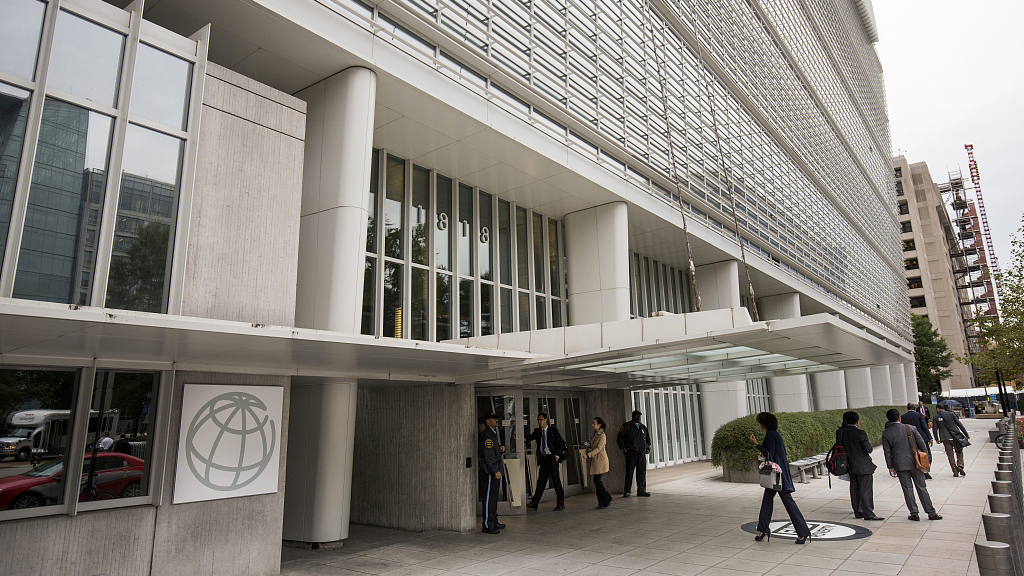
The World Bank headquarters in Washington, DC. /VCG Photo
The World Bank headquarters in Washington, DC. /VCG Photo
Editor's Note: Huang Jiyuan is an opinion editor with CGTN Digital. The article reflects the author's opinions, and not necessarily the views of CGTN.
For those who dispute the new Cold War isn't here, it's time to consider that maybe the old one has never ended for some people in the United States.
On December 5, the World Bank announced its five-year lending strategy plan for China. Through June 2025, the World Bank will be providing China annually with one- to 1.5-billion-U.S.-dollar low-interest loan, aiming to encourage China's private sector development, promote green growth, and address social inequalities.
The announcement of the loan has met a flurry of criticisms from the U.S. government. Politicians in the Executive and Legislative branch have claimed that the loan shouldn't be made. Their reasons however, upon close examinations, show the deep-seated political drive and a deliberate confrontational manner they've chosen to deal with China.
In response to this loan, U.S. President Donald Trump and Secretary of Treasury Steven Mnuchin suggest that China is too wealthy for a loan. Given that China is the second largest economy in the world, it is reasonable for them to make such an argument. However, they've disregarded the fact that in a worldwide ranking, China per capita GDP is still ranked around 70th while the U.S. is among the top five. China is still decidedly a middle-income country. Saying that China as country is too wealthy is grossly generalizing a complicated economic reality.

Despite poverty alleviation's tremendous success in the past several decades, 16.6 million Chinese rural residents are still living in poverty, as of 2018. /VCG Photo
Despite poverty alleviation's tremendous success in the past several decades, 16.6 million Chinese rural residents are still living in poverty, as of 2018. /VCG Photo
However, even with a reasonable argument to make, White House's response has been characterized by media as driven by the trade war. It is noted by the New York Times that the current President of the World Bank, David Malpass, served the Trump administration as the Under Secretary of the Treasury for International Affairs and was nominated by President Trump himself to become the World Bank's President. NYT finds that Mr. Malpass has defended World Bank's cooperation with China numerous times in his tenure.
So, if a former senior official in the Trump administration defends the institution's work with China, what else could more likely to be driving the White House's response other than the fact that it is currently in an economic conflict with China? Denouncing international loan to a certain country because of political conflicts is an old trick from the Cold War playbook.
If the White House's response could still be considered as driven by politics, then rhetoric coming out of the Congress is rooted in a the categorical denunciation of China regardless of truth and facts. Senate Finance Committee Chairman Charles Grassley objects on the ground of China's alleged violation of human rights in Xinjiang and desire to dominate weaker countries. Representative Anthony Gonzalez simply claims that "even a dollar is too much for our taxpayers to be contributing to China".
These two statements, in fact, are of the same content. Anti-terrorism is the goal of Chinese government's policy in the region. The vocational education and training center is aimed at reeducating people who might have turned to extremism, so that they could find jobs and steer clear of terroristic tendencies. Journalists and UN envoys have all been invited to visit these centers to see the reality for themselves.

David Malpass (L) was nominated by U.S. President Donald Trump as the new president of World Bank Group. /Photo via Reuters
David Malpass (L) was nominated by U.S. President Donald Trump as the new president of World Bank Group. /Photo via Reuters
And yet despite these efforts, people like Senator Grassley still cling to the old mind-set that any system of different sorts from the United States' must be repressive and people living in them are waiting for salvation. Grassley's hardened illusion that China will dominate weaker states is nothing more than projecting U.S.' own history onto China. Just because the United States solidified its position in the world by asking, cajoling, and threatening other states into toeing U.S.' line, he believes that China would do the same.
These believes make Senator Grassley's position no different from Representative Gonzalez's. Their analysis of the situation isn't based on objective policy studies and on the ground researches, but a sense of what they believe should be happening. Their denunciation of the loan is in fact a denunciation of China. This categorical rejection of a country and the refusal to accept difference are what started the Cold War in the first place.
It is karmic to see that the World Bank's board has "expressed broad support" for engagement with China while the United States, World Bank's largest stakeholder, denounces it. The institution created by U.S.' to build a rule-based international system is still serving the same objective and maintaining a global community that solves problems together. It is the U.S. who has gone rogue – or revealed its inability to move past the era of superpower competition.
(If you want to contribute and have specific expertise, please contact us at opinions@cgtn.com.)